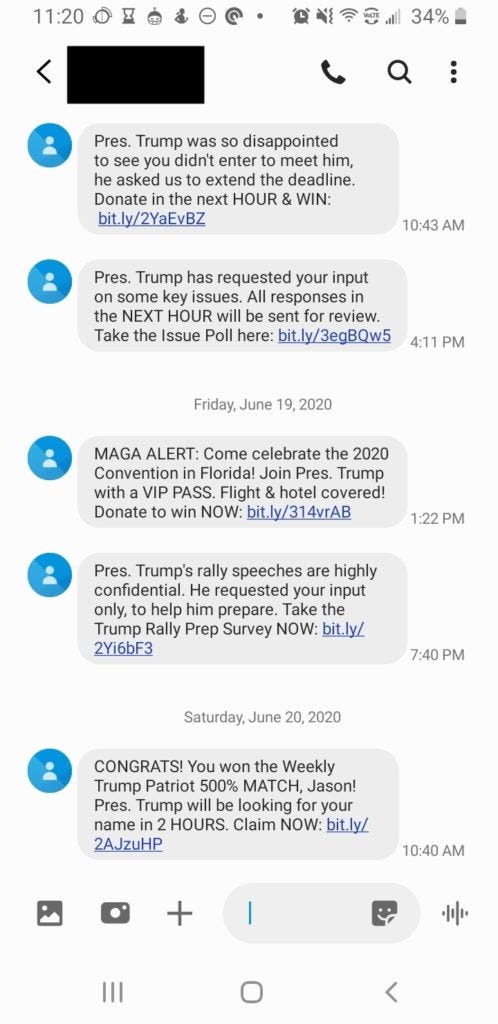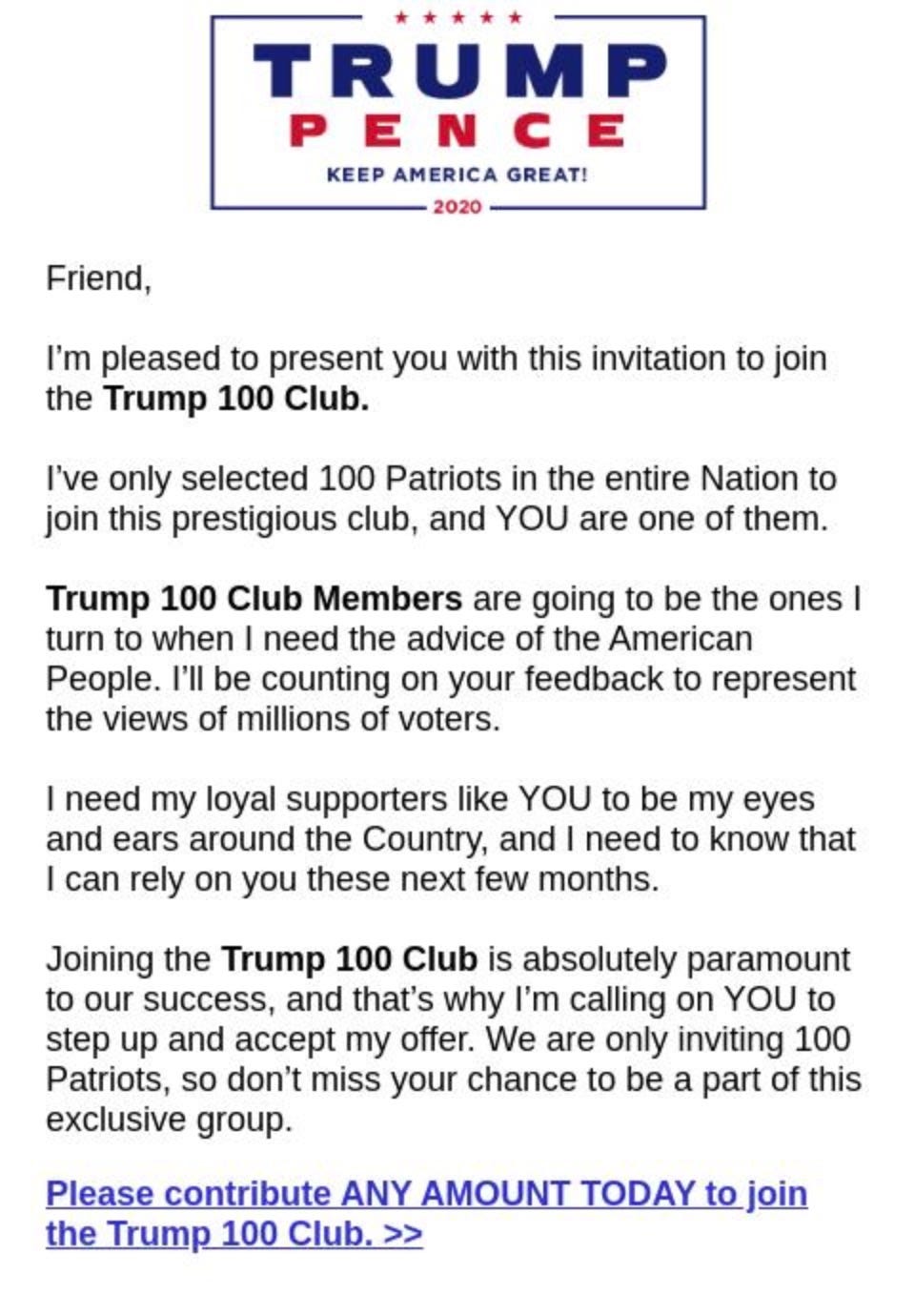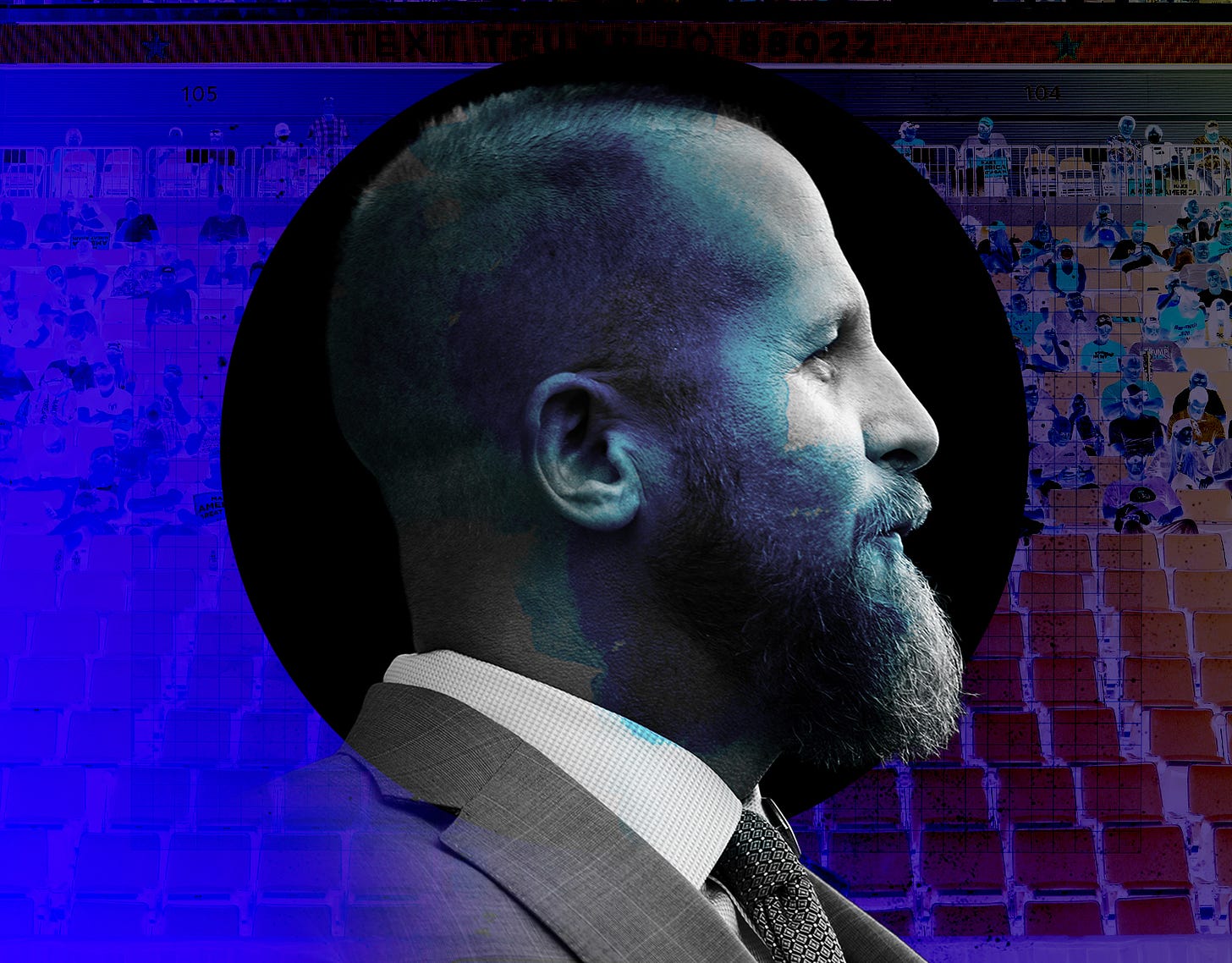Why Does Brad Parscale Still Have a Job?
Look at the big brain on Brad!
Here are some things you need to know about Brad Parscale, the campaign manager for Donald Trump’s reelection effort.
(1) Five days before Trump’s Tulsa rally, Parscale publicly bragged that there had been “over 1M ticket requests.”
(2) In preparation for this mass event, the Trump campaign rented out not only a 19,000 seat arena but overflow space next to it. The campaign planned to have the president and vice president make remarks both inside the arena and outside on a stage built for the overflow crowd.
(3) The population of the entire Tulsa metro area is 991,000. Meaning that in order to think that “over a million people” were going to show for this rally, you needed to believe that every man, woman, and child in the region was going to show up. And then another 10,000 people from out of town were going to travel to be there, too.
(4) On Saturday, 6,200 people showed up for Trump’s rally.
Parscale is an interesting character for many reasons, not least of which is that this is the first time he’s ever been the manager of a political campaign.
Not “of a presidential campaign,” but of any political campaign.
In the normal course of events, presidential campaign managers are people who spend decades learning how electoral politics function, from the micro to the macro. They have run dozens—sometimes scores—of campaigns at every level. They understand paid and earned media work; the mechanics of voter mobilization; how the narratives of a campaign are born, can be massaged, and can—or can’t—be changed.
How is it working out for Donald Trump to have Parscale learning on the job?
Well, the last time a sitting president failed to win reelection was 1992.
Also, since 1932 elected presidents seeking reelection have lost only twice.
And Trump currently trails Joe Biden by more than 9 points in the RealClear average and has trailed Biden in all but four of the polls taken in the race ever.
So . . . not working out great for the president.
I have a great deal of sympathy for Trump in this.
After all, every previous president was a man who had spent his life learning how government, or at least the military, functions. America electing Trump to be president was like Trump hiring Parscale to run his campaign.
And look how that’s worked out for us.
In the months leading up to this point there was a lot of talk about Parscale’s brilliance, how he had built a “Death Star” of such vast technological brilliance that the Trump campaign would march to victory this coming November.
These stories were unfalsifiable.
The nature of Parscale’s digital weapons was that they were invisible to anyone but the select individual voter. He claimed that the right voters would be targeted at the right time with tailored messages that would push them to the polls and deliver a victory.
And all of this would become clear on November 4.
But until then, the president and the rest of his team have to trust Parscale’s black box.
They also have to do something that Trump’s 2016 campaign explicitly rejected.
The original Trump campaign was predicated on a simple idea: That the voters want what they want.
Trump 2016 eschewed all of the traditional modes of organizing and targeting. It postulated that sophisticated campaign mechanics were meaningless because you couldn’t force voters to show up for a candidate they didn’t like. This anti-strategy was, in its own way, a rejection of the animating idea of the Romney 2012 campaign: that organization and infrastructure are more important than enthusiasm.
Yet Trump 2020 is in many ways a return to Romney 2012.
There is no idea behind Trump 2020. The attempt to brand “Keep America Great” for the reelection campaign was dead on arrival. The country is now in shambles. The president is deeply unpopular. Save a gigantic corporate tax cut, most of his major legislative initiatives failed during his first term. He has neither plans to complete them nor new initiatives to take their place.
Instead, Trump 2020 has the Parscale digital operation and the assurance that Big Data will be enough to hump the campaign to a narrow Electoral College victory.
“Organization and Infrastructure 2020.” Go put that bumper sticker on the back of your truck.*
Now maybe Brad Parscale really is the greatest data wiz to ever dabble in politics. Maybe he figured out a secret sauce that no one else in the long history electioneering has ever seen. Anything is possible.
On the other hand, whenever we on the outside get glimpses into what Parscale’s operation looks like to ordinary voters, it does not look especially sophisticated.
There are the email surveys sent to people who are opposed to Trump and have questions that are hilariously out-of-date.
There are the emails claiming that the recipient is one of only 100 people who have been hand-selected by president Trump himself to join an exclusive “Trump 100 Club.”
And there are the text messages.
One of Parscale’s talking points has been how the Trump campaign is using text messages in new and deeply effective ways that have never before occurred to political operatives.
On Monday I got an email from reader I’ll call Steppenwolf who kindly shared some of the text messages he’s gotten from the Trump campaign:


Steppenwolf adds, “I have received many texts from the Trump campaign talking about my ‘exclusive 5x Match for only 10 Patriots hand selected by Don Jr.’ etc. To put [the volume of these texts ] in perspective, either of the two numbers the campaign uses has sent me more texts than anyone else I know (excluding my wife).”
And just for good measure, Steppenwolf shared with me a Trump ad that Facebook served up to him over the weekend:

That’s right. Parscale’s fully-armed and operational battle station served up an ad featuring the floating head of . . . Barack Obama.
Obama’s favorability rating today is +24.
Trump’s favorability rating today is -13.
Does Brad Parscale really think that contrasting Trump with Obama is going to help Trump get re-elected?
Actually, I don’t think he does. To understand what Parscale is doing, you have to flip the telescope around 180 degrees and realize that he didn’t build a Death Star. He built the biggest Nigerian prince scam in the history of the world.
But the target of this scam wasn’t the rubes on the internet—how many people do you think could possibly be taken in by a garbage piece of spam like this:


No. Brad Parscale built a scheme to take dead aim at the president of the United States. And the big guy bit.
If you've ever wondered how Parscale managed to hold on even this long, the answer may be that he pulled enough sensitive information into his orbit that he made himself not indispensable, but un-fireable.
At least until now.
That look you saw on Trump’s face Saturday night? That wasn’t sadness or defeat. It was the realization that he’s been the mark all along.
* I’ve stolen this line. I first heard it in a bar in New Hampshire, back in 2012, from Hogan Gidley. At the time, Gidley was the comms director for Rick Santorum and he was griping about how uninspiring the Romney campaign was. Today Gidley is deputy press secretary for President Trump.
Life can be cruel in that way.
Correction June 23, 2020 11:08 a.m.: The article originally stated that Brad Parscale was not at the Tulsa rally. This is incorrect. He was present in Tulsa on June 20.





